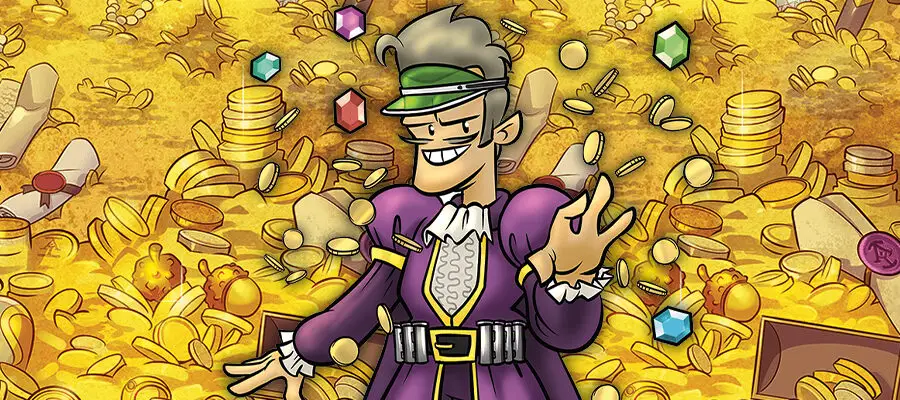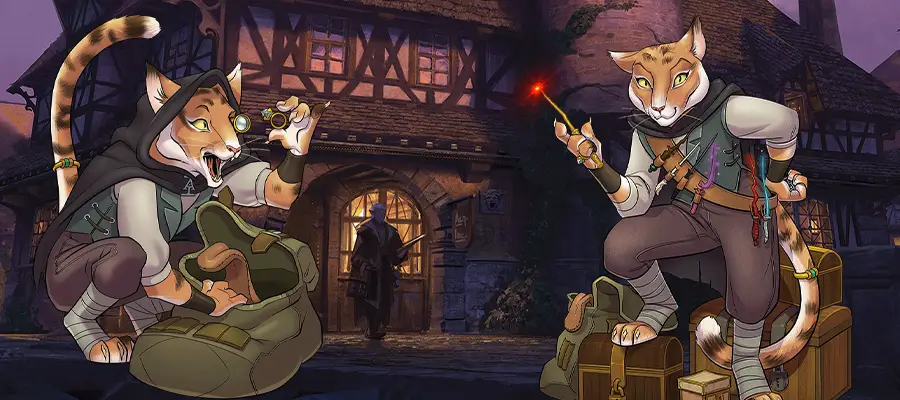Featured D&D 5e gold spending art is a combination of images by Wizards of the Coast from Acquisitions Incorporated.
This article contains affiliate links that add gold to our coffers.
I’ve noticed a common complaint with D&D 5e’s gold and wealth system, specifically that it doesn’t matter. I’ve never had issues spending my gold at low or high levels of play, so I want to share how I spend gold in my D&D 5e games. My goal is to help DMs set up players with exciting wealth uses, and inspire players to find creative, industrious uses for their gold. I’m going to share how I invest my coins to avoid carrying them around while I’m encumbered by thousands of coins.
Wealth is not treated equally in every 5e game. I played in a game recently where all our wealth was assumed; the DM didn’t give us gold, handling each inquiry of wealth and spending as they came. There are many other ways of playing the game and handling wealth, but I prefer the classic system of characters having gold. Let’s turn that gold into value for your characters and fun for your players! My ideas and methods are not one-size-fits-all, but I guarantee you’ll discover a new idea or rediscover something you’ve forgotten or neglected.
Here is what we’ll discuss in this article:
Why it’s difficult to spend gold in D&D 5e
Coinage Explained
Strongholds and Property
Followers and Proteges
Lifestyle Expenses
Mounts and Vehicles
Training
Practical Shopping
Buying Magic Items
Crafting Magic Items
Spell Components
Spell Permanence
Wizard Spellbook Expansion
Gifts and Bribes
Collections and Outfits
Alchemy, Herbalism, and Monster Harvesting
Before I get into my ideas, I highly recommend The Armorer’s Handbook: Equipment Upgrade and Rune Magic System as a great way to supplement weapons and armor in the game and allow players to spend gold in meaningful ways.
Why It’s Difficult to Spend Gold in D&D 5e
The common adventure modules and homebrew campaigns for D&D 5e are plot-based. They have an overarching plot that is the focus for the better part of the campaign duration. Plot-focused campaigns have a downfall; they don’t give players downtime.
Downtime is the leisurely duration of time between urgent adventuring. It allows characters to spend their gold and use their property and wealth in meaningful ways. Players love having a home base or a stockpile of magical armaments.
D&D 5e was designed to have heaps of downtime. How do I know this? The rules for crafting magical items make this clear. They’re supposed to require months or years with mounds of gold to create some magic items. Sure, maybe 5e designers made these rules to merely gatekeep that kind of crafting; maybe they wanted to say “no” without saying “no.” I choose to believe that D&D 5e was supposed to still focus on dungeon crawling and classic adventuring styles that older editions of the game focused on, especially prior to 3rd edition.
It’s clear to me that the main player base of 5e does not focus on this style of play. They focus on storytelling with a fairly linear progression toward the resolution of that story, then they start a new campaign. If you really want to make wealth and downtime part of your game, I highly recommend you embrace a more episodic style of play. That means each session or short series of adventures will wrap up in their own way. Macro story plots shouldn’t be so urgent and evident that they interfere with the players’ downtime.
If you want to know more about this disconnect between 5e’s downtime rules and the practical application of 5e players, let me know. Otherwise, let’s move on to talk about GOLD!
Coinage
For anyone in need of a reminder, here are the exchange rates for D&D 5e coins per the PHB (or the SRD). Exchange rates come up more often than I anticipated, qualifying as something I’m glad they taught me in school. You must understand gold before you can spend gold!
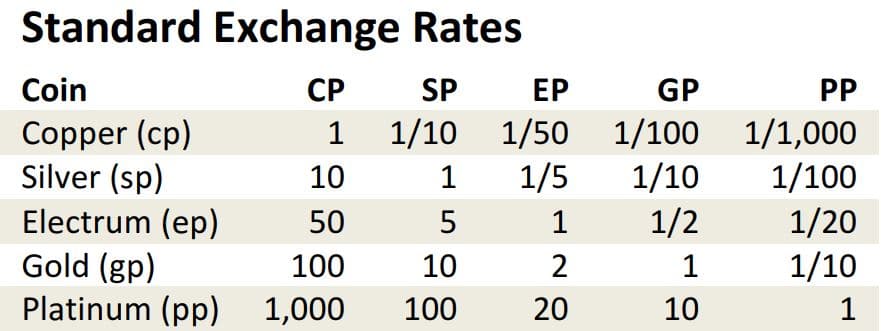
Building and Developing Strongholds
The DMG p.126 begins the Recurring Expenses section with a table on the following page. The table provides upkeep costs for properties. If you’re not using Strongholds & Followers, you might incorporate this DMG table to develop your own property system. Running a palace is expensive…
A few pages later, DMG p.128 has cost and time to build various strongholds in the “Building a Stronghold” table. Construction time can take years, and you’ll need to own property. This incentivizes you to promote your deeds in the land so you may be eligible to purchase land or receive it as a gift from a kingdom. It’s a lengthy process, for sure, but there’s a lot you can do with a stronghold and a following.
Book Mention: Strongholds & Followers
A third-party supplement exists to help you with stronghold systems. Matt Colville and his team at MCDM have produced an excellent book, Strongholds & Followers, that expounds on strongholds that each class might develop and followers they may attract or hire. If you have gold, consider developing your own buildings and organizations to give you mechanical benefits and fresh opportunities. I turn to the book if I believe a player is interested in a stronghold and its benefits. As of this article’s publication, MCDM is out of stock with hardcover copies. You can purchase their PDF version of Strongholds & Followers here (I do not receive a commission; I just like the book).
D&D 5e doesn’t have a robust system that is widely enjoyed by its community for building strongholds and developing followers (other than sidekicks in TCoE). I recommend discussing with your DM the ways you’d like to spend your gold this way. If you approach your DM with suggestions that save your DM work, it’ll be even better for both of you. Your DM won’t have a whole new system to develop from scratch, and you’ll get to have a hand in developing the system that works for your game group.
Strongholds aren’t always fortresses; they can be Wizard towers, Druid groves, Cleric temples, or Rogue criminal fronts. The type of organization you establish can grant you different benefits, depending on the organization’s nature. One of the most interesting benefits I discovered was for Wizards to have a team of proteges who research magic to invent new spells or combine old ones. They might also create spell scrolls for you while you’re adventuring. It’s difficult for adventurers to find downtime, but followers may have plenty of it. Spending gold is easy when you have bills to pay.
Proteges, Wards, and Other Followers
Referring to the Strongholds & Followers book again, you can make great use of followers with your gold and wealth. Creating a posse of followers will allow you to count on them for the tasks you don’t have time for. Many gold-spending methods I expound on in this article can be utilized readily when you have a following of pupils, employees, or otherwise. Spending gold is easy when you’re constantly Venmo-ing your friends!
Downtime’s greatest downfall is in its name: time. Many hands make light work, so use your followers! Establishing a base will allow your followers to research, build, sell, scout, and anything else you can think of. Give them the funds and support that they need, and they’ll get the job done while you’re away.
You can establish a spy information network if you are willing to pay for it. Loyalty is critical in a spy network, so you need to treat your followers well. They can remain spread out if you don’t need to locate them somewhere like a guildhall or fortress, but you’ll need methods of long-distance communication.
It’s worth mentioning the Sidekicks system from Tasha’s. Parties with few members can benefit from developing sidekicks if they have usually-weak friends. Opal ran a test campaign for me once upon a time. I was the solo player, and sidekicks were super fun to use. You don’t have to pay to have a sidekick mechanically, but they fit this topic.
The DMG also encourages players to utilize hirelings. PCs can hire NPCs by adding the cost to their lifestyle expenses.
Lifestyle Expenses
The PHB has rules for expenses based on lifestyle on page 157. I’ve seldom seen this system used in-game, so it’s the definition of optional. Here’s how lifestyle expenses can make your game better! Once you’ve established a business or thrown in with a guild of sorts, you may assume your dues and expenses are part of your lifestyle. Settling for squalid accommodations won’t help you spend your gold, but it may help you keep a low profile in whatever city you’re lodging.
If you’re paying your lifestyle expenses, the DM might hand-wave particular checks for you or allow you to assume you have certain items, resources, or contacts in a moment of need. Paying for an aristocratic or wealthy lifestyle has its perks if you don’t mind the company and upkeep. The book also says of an aristocratic lifestyle that “you must also contend with the highest levels of deceit and treachery. The wealthier you are, the greater the chance you will be drawn into political intrigue as a pawn or participant.” That sounds like heaps of fun!
You may also use the table for food, drink, and lodging on page 158 of the PHB to make friends very quickly (a lot of friends). Buy a round of drinks for everyone and see how the ale greases palms to learn local secrets and rumors. Please bring a bottle of fine wine to the cool-guys table for a subtle approach to see what they know.
Mounts and Vehicles
Mounts are incredible in D&D 5e. They can carry heaps of weight, provide mobility, and more. Some of my favorite resources for mounted tactics include videos by Pack Tactics, Bilbrons & Dragons, and Treantmonk.
You can pay for exotic beasts of burden and fancy barding for them. Most mounts are horses or similar creatures, but the PHB (p.157) has costs and other stats for you to buy elephant and camel mounts. You can obtain a variety of creatures to become your mounts if you’re savvy. Spending gold is easy when you want to purchase or breed a perfect mount for your character.
Mounts commonly enable you to use land vehicles. Sleds are available for snow conditions, and wagons are available for the usual roads. You can buy war chariots or aristocratic carriages.
Massively important if you enjoy realistic carrying with encumbrance. After all, Strength often feels inferior to Dexterity because jump distance, carrying capacity, pushing power, and other Strength-based game mechanics are ignored or irrelevant.
Don’t neglect seafaring vessels. The PHB (p.157) describes them in the same section as mounts. You can create a naval warship, a merchant vessel, a pirate ship, or anything else you can think of while navigating the waves.
By the way, gold coins can become extremely heavy. Beasts of burden to help carry your loot after clearing a dungeon, lair, or encampment. Stuffing your pockets with gold pieces will only get you so far. Many 5e players don’t enforce encumbrance or spatial awareness. Pouches and backpacks are practically bags of holding in most gaming groups, assumedly expanding to carry all loot. I enjoy those carrying details, so I enforce them for myself instead of forcing other players to suffer through it or cause the DM to fret over carrying capacities.
Training
There is an optional tool for DMs to make leveling up feel more meaningful and purposeful. The DMG p.131 suggests requiring a period of training with time and cost increasing as characters increase in level. This is a natural way to slow the game down and encourage downtime activities. Tell your DM if you’re interested in this concept or if you think it would help their gaming style.
I would recommend making the costs more expensive for full spellcasters and slightly more expensive for partial spellcasters. It might make sense to make multiclassing comparatively pricey. You can keep the training time the same, but gold costs may vary in whatever way makes sense to you.
I believe player characters can train to learn new skills, increase their stats, or gain a feat. Having said that, I think the costs and time commitments should be great. Characters shouldn’t become individually good at everything.
Practical Shopping
This won’t break the bank, but if you go through the adventuring gear in the PHB, you can envision the types of supplies your character would be using regularly or occasionally. I’m about to play in the Rime of the Frostmaiden campaign. I realized how much my character would want to spend on supplies like shovels, camping gear, and navigation tools for character creation. I also invested in a dog sled since I’m playing a Halfling Barbarian that needs to get around and won’t carry as much as medium-size creatures.
You can do this in any campaign to explore what your character would carry. Spend your gold on your authenticity! There is much roleplaying to be done when you have stuff. Spending your gold can be based on roleplaying. This is true to real-life where people use clothing and things to express themselves. Even food can be a roleplaying opportunity.
Buying Magic Items
You don’t require a stereotypical magic item shop to deal in magic items. Prominent nobles, merchants, lords, and other powerful people and monsters may be willing to part with magic items treasured by their households and groups. Finding a magic item can involve schmoozing with the right crowds, as I mentioned in my explanation of lifestyle expenses. Spending gold is quick and easy when you can purchase magic items.
As characters gain renown in the land with their deeds and words, they may gain an audience with those who influence the realms. Players may offer combinations of gold piles, errands, and alliances to earn relics and heirlooms.
There may be odd arcane peddlers who travel the land looking for stooges. These may be sources of cursed or wicked items, leading to plotlines involving powerful entities (like the Warlock Hexblade patrons). There may be counterfeit items to create a game of cunning between observant, paranoid characters. There may be genuine items that unseen cabals seek (maybe it recently belonged to them until nimble fingers came creeping).
My point is that DMs can enable you to use gold to move the plot along while obtaining magic items that suit you. Try talking to your DM, then use your roleplaying chops to add story weight to the methods of arcane acquisition. You can reference the DMG for expectations on gold costs to obtain magic items by their rarity; DMs will find this table helpful.
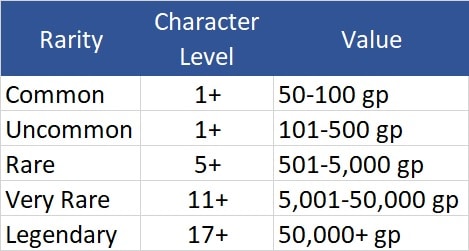
Crafting Magic Items
We at Flutes Loot love to craft magic items. We have heaps of articles that the community has found very helpful for magic item crafting. You can learn how to create formulas, apply general crafting rules, and use specific items like wands and spell scrolls. I highly recommend you check out those articles to supplement this one. Spending gold is simple when you’re crafting magic items.
DMs handle arcane crafting in different ways. Some of them don’t do it, while others heavily involve it. Ask your DM how they handle magic item crafting. If your DM wants suggestions, you can provide them with the table below that summarizes the 5e rules for magic item crafting. The table is a DMG guide by rarity and consumability of a given item. Consumable items are easier to create (half the time and gold), so I recommend creating potions and spell scrolls in your spare time.
Remember, you can hire NPCs to help you craft items to speed up the process. You’ll spend more gold to do so, but this article is about how players struggle to spend their gold. Saving time and spending gold is preferred! I suggest dividing the crafting days by the number of crafters. Two hired crafters would create a spell scroll of Bless in one day instead of two, but they would need at least one able crafter to cast Bless into the scroll.
DMs may require skilled labor to craft magic items. Your party may need to have a proficient member with appropriate artisan tools for a given item. NPCs may need to be similarly skilled workers, too. Potions may require alchemist supplies and/or proficiency with alchemist supplies, for example.
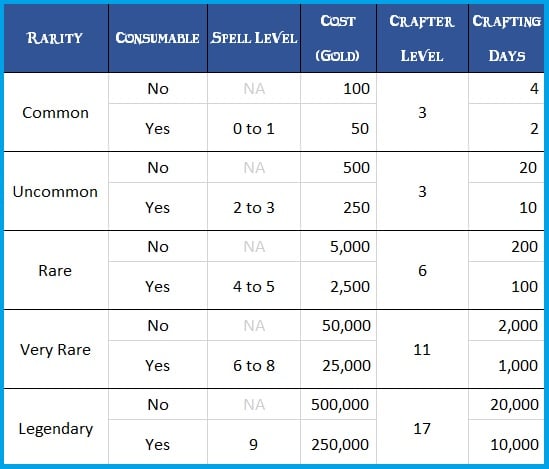
Spell Components
It’s baked into the game to have gold equate to material components for powerful spells. Spellcasters know components can be expensive and elusive. Even non-spellcasters know the value of material components in the party, so they would do well to help out their magical friends. Rare diamonds and other gemstones may require searching for a seller if the components aren’t found, mined, or otherwise harvested.
DMs can enjoy mixing up the types of materials needed for spells, so the usual gemstone of x gold value doesn’t get old. I wrote an article about swapping out diamonds and gems for items of greater interest if you’re interested. In addition to getting creative with what types of components are required, they can provide what I called ‘enhanced spell components‘ as rewards to spellcasters. This is a concept I undoubtedly was not the first to create, but I did write about it, too. You can read about how DMs can provide alternative components for spells that empower the spells beyond their usual potential.
Long-Term Spell Fixtures (Spell Permanence)
You may have noticed there are crazy spells in D&D 5e for anyone with the luxury of wealth, a defensible domicile, time, and magical capability. Though expensive when done in bulk, these spells are beneficial and, frankly, terrifying in the hands of wealthy adventurers. Spending gold is easy when you have an arcane base to defend or develop.
Spending Gold with Glyph of Warding
The Glyph of Warding spell can create traps with explosions or harmful stored spells. Alternatively, Spell Glyphs (an option of Glyph of Warding) can contain beneficial spells to save you spells slots and time in moments of need. It’s important to note that Glyphs of Warding can release concentration spells at their entire duration with no concentration required. A Wizard can gain the benefits of Haste by merely stepping on the glyph and using a custom command word. There is much potential in this third-level spell if you have the means.
Spending Gold with Symbol
Symbol spells require 1,000 gold worth of mercury, phosphorous, or powdered diamond and opal. This spell is bonkers. The casting time is one minute, so you can potentially use it while away from your save point… I mean, home base. The Symbol spell is a potent trap spell that can completely wipe out war parties and hostile groups. The area is massive and perpetual, and the Symbol remains until triggered or dispelled. If you’re sitting on a ton of cash, you can defend yourself very well with Symbol.
Spending Gold with Teleportation Circle
Teleportation Circles can become permanent with enough time and magic chalk. If a spellcaster and/or its followers cast Teleportation Circle in the same spot every day for one year (assuming the real-world 365 days). The benefit of a permanent circle is to be able to teleport to a specific place reliably from anywhere on the same plane of existence. It’ll cost you 18,250 gold to permanently install your new bathroom Teleportation Circle.
Wizard Spell Investment
Spellbook looking empty? Help your Wizard help you by giving them more spells. You can purchase spell scrolls for your party’s Wizard to copy into their spellbook. You might sponsor the process further by covering the costs incurred to experiment with a new spell and record its arcane signature in the book. This can be an expensive process, and I think many players don’t realize it. Assisting the party Wizard in learning more spells will pay dividends as they’ll be more prepared with the perfect spells when the time comes.
It’s fun for Wizard players to learn pages and pages of spells. They want to experiment with spells they had to pass on when leveling up because there were better options for them. Just because a spell isn’t a top choice doesn’t mean the Wizard player doesn’t want it. Give your friend and fellow player a hand by sponsoring their spell expansion! They might Haste you for your trouble.
Gifts and Bribes
Grand gestures are available to you in the form of gifts. Spend your gold paying off someone’s house, adding extravagance to their wedding, or sending their gifted child to wizarding school. Buy someone a dress after seeing them wear rags during the campaign. Sponsor the local militia with new weapons and armor to gain favor and preserve their lives.
Money makes friends. Look for opportunities to spend your gold in meaningful ways. You can have a massive impact on NPCs’ lives. They might erect a statue in your honor to pay homage to your generosity and valor.
You may also focus on those around you. Your party members are worth investing in. Think of something meaningful to a party member and seek it out. I believe gift-giving is far easier to do in D&D because players rarely spend their money on practical, emotional things. They settle for the armor and weapon they desire without thinking about a decorative crest for their shield. You can put your painting skills to use by purchasing expensive paints and adding family emblems to a companion’s belongings.
Whether you surprise others with gifts or tell them your intentions upfront, you’ll make more friends and lasting memories by sharing your wealth… or you can settle for greeting cards and gift cards to favorite taverns.
It’d be my folly to omit bribery! You can go places (literally) by greasing a few palms with a bag of coins. Violence and words are not your only options.
If you’re playing a Feywild adventure like The Wild Beyond the Witchlight module, you’ll want to learn how to give thoughtful gifts. Fey creatures love gifts.
Collections and Outfits
Many adventurers need an intervention. They run around like Scooby-Doo characters wearing the same things every day. They don’t stop to wash, either. Your character can collect armor (think of Iron Man’s many suits), weapons, outfits, and anything else that might hold sentimental or fanciful value.
It’s effortless to have extra supplies and collections if you have a home base of sorts. I spoke earlier about having a place to call home that you develop and run, which would be a perfect place to keep your extra odds and ends. You can create a museum to document your exploits and show off your trinkets. Your dining hall can be adorned with tapestries depicting your mighty deeds, perhaps only slightly embellished.
Bards can collect instruments. Druids can collect plants from lands far away, particularly exotic poisons. Artificers might keep their failed inventions or the botched constructs of other inventors. Barbarians might collect furs, skins, horns, skulls, fangs, and other bodily trophies.
Third-Party Alchemy, Herbalism, and Monster Harvesting Systems
I wrote an article reviewing the Alchemy Almanac by heavyarms. It’s a fantastic example of third-party content that can add to your game. It’s a simple way for players to gradually spend their gold as they play without having to interrupt adventures for shopping. I highly recommend checking out my review article on the Alchemy Almanac. I also have a YouTube video about the Alchemy Almanac.
Conclusion
I hope I inspired you to use your gold and work with your gaming group to do it! There are heaps of resources for you to reference if you want mechanics and systems for spending your gold in diverse ways, but you can always homebrew your own systems or handle spending on a case-by-case basis. You can develop a following, gain a reputation, build a stronghold, and craft items to give your party an edge against foes.
Do you have money burning a hole in your pocket, and this article gave you ideas to spend it? Let me know! Cast Message in the comments section below to tell me about how you spend gold in your campaign.
Before you go, I highly recommend our top-rated articles and categories as you continue exploring D&D 5e. Have a lovely day!
- Top-read articles
- Crafting magic items
- Player resources
- DM resources
- The Armorer’s Handbook: Equipment Upgrade and Rune Magic System is a great way to supplement weapons and armor in the game and allow players to spend gold in meaningful ways.

